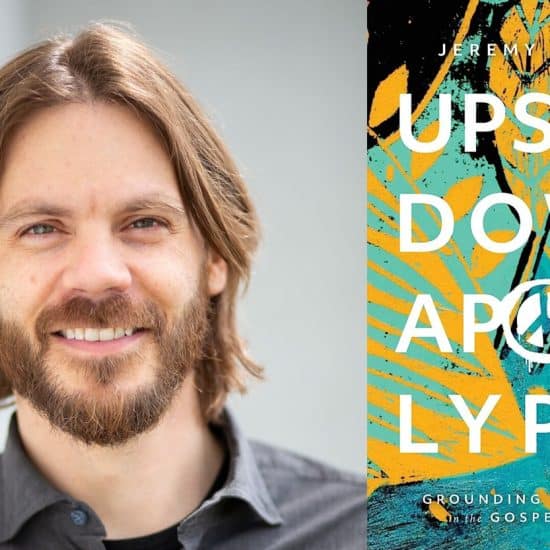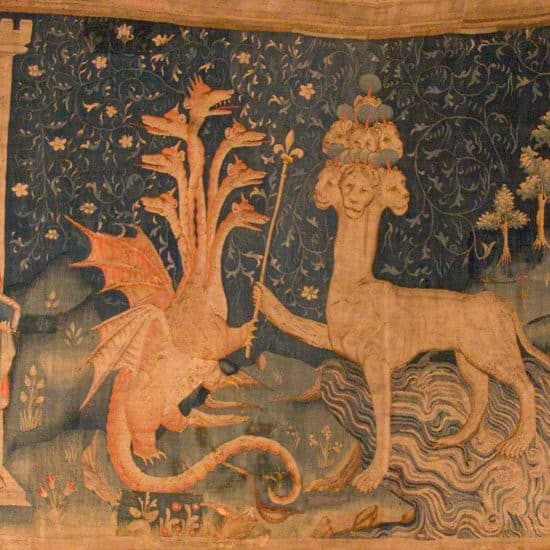 The heavenly vision
The heavenly vision
Formations: October 30, 2016
Scripture: Revelation 1:9-20
 Michael OlmstedRevelation is written in a style that fits into the fashionable entertainment of our day: sci-fi, mythological creatures at war and strange beings from another dimension, connected by violence and terror.
Michael OlmstedRevelation is written in a style that fits into the fashionable entertainment of our day: sci-fi, mythological creatures at war and strange beings from another dimension, connected by violence and terror.
The first Greek word of John’s New Testament book is “apocalypse,” meaning “disclosure” or “revelation.” The term “apocalypse” was later borrowed from John’s Revelation to apply to several Jewish writings from 200 BC to 100 AD. To understand this complex book you must remember it is highly symbolic, using colors, numbers, people and animals (creatures) to represent historical and spiritual realities. Many of these powerful images come from earlier Old Testament writings such as Daniel, Ezekiel and Isaiah.
Revelation is a narrative about eternal hope, written in powerful images, and appropriate for any calendar date. John is very clear that what he writes came as “I was in a Spirit-inspired trance on the Lord’s day,” when a voice as loud as a king’s trumpet said, “Write down on a scroll whatever you see and send it to the seven churches” (vv.10-11).
At the end of the first century, persecution of Christians was not widespread, but there was real danger to followers of Christ in Asia Minor, where many pagan cults influenced government and the economy. So the seven original recipients of John’s Revelation (Ephesus, Smyrna, Pergamum, Thyatira, Sardis, Philadelphia and Laodicea) were places dangerous for those who publicly lived their faith. John was personally acquainted with the persecution these churches faced. He was writing while exiled for his faith on the remote island of Patmos. He was probably sent to Patmos by order of a provincial governor who took particular offense to John’s preaching that Christ is king, an insult to Caesar. John’s situation was bleak: isolation, a solitary cell, spare diet and forced labor. Given the evidence of John’s love for other Christians in his writings, such separation would be very painful. But the vision John records contains no fear, bitterness, loneliness or hopelessness. On that “Lord’s day,” separated from those he loved most, John the Beloved wrote a vision of hope and victory for all Christians.
The vision immediately focuses on Jesus Christ, the “Human One” (Son of Man), a reference to the Old Testament book of Daniel. Jesus stands in the midst of seven lamp stands burning brightly, identified as the seven churches (v.20). Eight distinctives of the triumphant Christ are described. He is clothed in a full-length white robe with a gold sash across his chest, the attire of a priest who stands between us and God (v.13). His hair is white as pure wool or snow, an image of purity or holiness (v.14). His eyes are like fire, seeing into every heart and offering the hope of spiritual transformation (v.14). His feet shine as fine purified brass, radiant with the glory of God (v.15). His voice sounds like a cascading waterfall, adding to his awesome appearance (v.15). He holds seven stars in his right hand (v.16) representing “the angels of the seven churches” (v.20), because they are secure in his power. From his mouth comes a “sharp two-edged sword,” for his words are the very power of God to overcome evil and transform lives (v.16). His appearance is like the unequaled sun for its light and power, for Christ is the light of the world (v.16).
For John, isolated from those he loves, daily facing the despair of prison darkness, wondering what will come next, there is a transformation of hope – the appearance of the Jesus who taught him, walked the dusty roads with him, transformed so many lives by his power and love and then overcame death. In that moment of darkness everything changed with this vision of Jesus. Revelation is not about figuring out a timetable, identifying the signs, knowing the date of Jesus’ return, knowing the name of the antichrist or even relishing the punishment of those who are evil. Revelation is about hope, holding on to God, trusting the God who send his own Son as the ultimate proof that he loves us.
Like John, we must come to a renewed understanding that Jesus is Lord, no matter what is happening around us. When Jesus is at the center of your heart and mind, you can overcome the darkness of this world. My television is turned off more these days because of the constant assault of hateful and vicious political ads, the stories of genocide, pictures of people without hope and examples of bigotry. I still watch the news and read for information, but I am disheartened by the hatred and vile words coming from some who claim to be Christians.
We who call ourselves “the church” cannot afford to be silent and withdraw. The gospels show us a Jesus who became involved with hurting people, loved outcasts and offered God’s grace to all. He knew what it meant to be rejected, cursed and called a false prophet even by his own people. Jesus experienced ultimate rejection on the cross, but he never stopped offering God’s love to the world. The world repeats its cycles of hate and violence, but as Christians we must remember God’s love does not fail and God’s purpose will not be defeated.
When John saw Jesus he fell at his feet as a dead man, but Jesus reached out to John and spoke those incomparable words of timeless hope: “Don’t be afraid. I’m the first and last, and the living. I was dead, but look! Now I’m alive forever and always. I have the keys of Death and the Grave. So write down what you have seen, both the scene now before you and the things about to unfold after this” (vv.17-19).
Jesus is Lord! As our Savior’s time on this earth was coming to a close he said to his disciples: “These things I have spoken to you, that in Me you may have peace. In the world you have tribulation, but take courage; I have overcome the world” (Jn.16:33). This is the hope that John the Beloved held onto, the hope that is enough!
Retired after more than 45 years in pastoral ministry, Michael K. Olmsted enjoys family, supply preaching and interim work, literature, history, the arts and antiques.
Formations is a curriculum series from Smyth & Helwys Publishing, Inc. through NextSunday Resources.
The PDF download requires the free Acrobat Reader program. It can be downloaded and installed athttps://get.adobe.com/reader.




